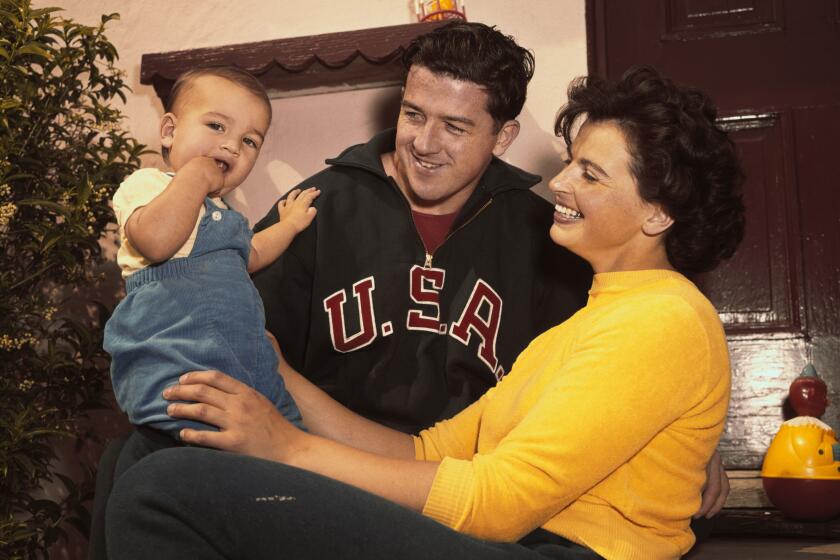At last, a gold medal for Federer
BEIJING -- He is the ultimate Swiss timepiece now. Gold, no less.
Roger Federer has been pursuing a spot on the top platform of an Olympic victory stand for eight years and three Olympics, and it didn’t seem possible that he had yet to make the climb.
He has been the best tennis player in the world for long enough that your son or daughter could have started and finished college, but the Olympics have always been his banana peel.
Saturday night here, it finally came to pass: Dreams do come true, even for icons who have realized almost all of theirs. Federer won a gold medal and stood on the top step, listening to his country’s national anthem and fighting tears.
When the final shot missed off the racket of Sweden’s Thomas Johansson, Federer, who just turned 27, bounced up and down three times like an 8-year-old, then hugged playing partner Stanislas Wawrinka while they jumped up and down together. Before long, they were rolling around and celebrating on the court.
This was doubles, a game Federer usually recognizes only as he walks past matches on the back courts on his way home from a singles victory. By the nature of what he does, he is a loner -- in job description, not personality.
So, when he and Wawrinka took the Olympic title, beating Johansson and partner Simon Aspelin -- a four-time All-American at Pepperdine -- 6-3, 6-4, 6-7 (4), 6-3, the whole team celebration thing was new to Federer.
“I can’t hug a stranger when I win in singles,” he said.
Wawrinka, 23, who has worked his way up to No. 10 in singles, was of course no stranger.
“It is quite a special moment,” Federer said, “being able to share this with somebody, somebody you like very much.”
The scene was strange, mostly because Federer was out there with three other guys. Across the way, the best doubles team in the world, America’s Bob and Mike Bryan of Camarillo, was winning its bronze medal on a secondary court.
They had lost in the semifinals Friday night to the new Swiss sheriffs in town.
The Center Court Stadium was almost full. Red-and-white Swiss flags were everywhere. So were the ever-extroverted Swedes, many in silly hats with horns or fake blue hair. Hush-hush Wimbledon this was not.
No surprise, Federer was the best player on the court. For the most part, he was untouchable -- especially on his serve -- and Johansson and Aspelin are not chopped liver. Johansson won the Australian Open singles in 2002 and Aspelin won last year’s U.S. Open doubles with Julian Knowle of Austria.
So it was both fitting and symbolic to have the match on Federer’s racket at 5-3 of the fourth set.
“There is so much pressure,” Federer said, “but it is exactly where you want to be.”
At 40-15, the best second serve in the game kicked in heavily to Johansson’s forehand side. Federer followed it toward the net and watched the return float wide, never taking his eyes off until it hit the court.
Then, one of the most poised, composed athletes in the world, somebody who handles opponents, media and the public with level-headed maturity at all times, released the little kid in himself.
--
Go beyond the scoreboard
Get the latest on L.A.'s teams in the daily Sports Report newsletter.
You may occasionally receive promotional content from the Los Angeles Times.




